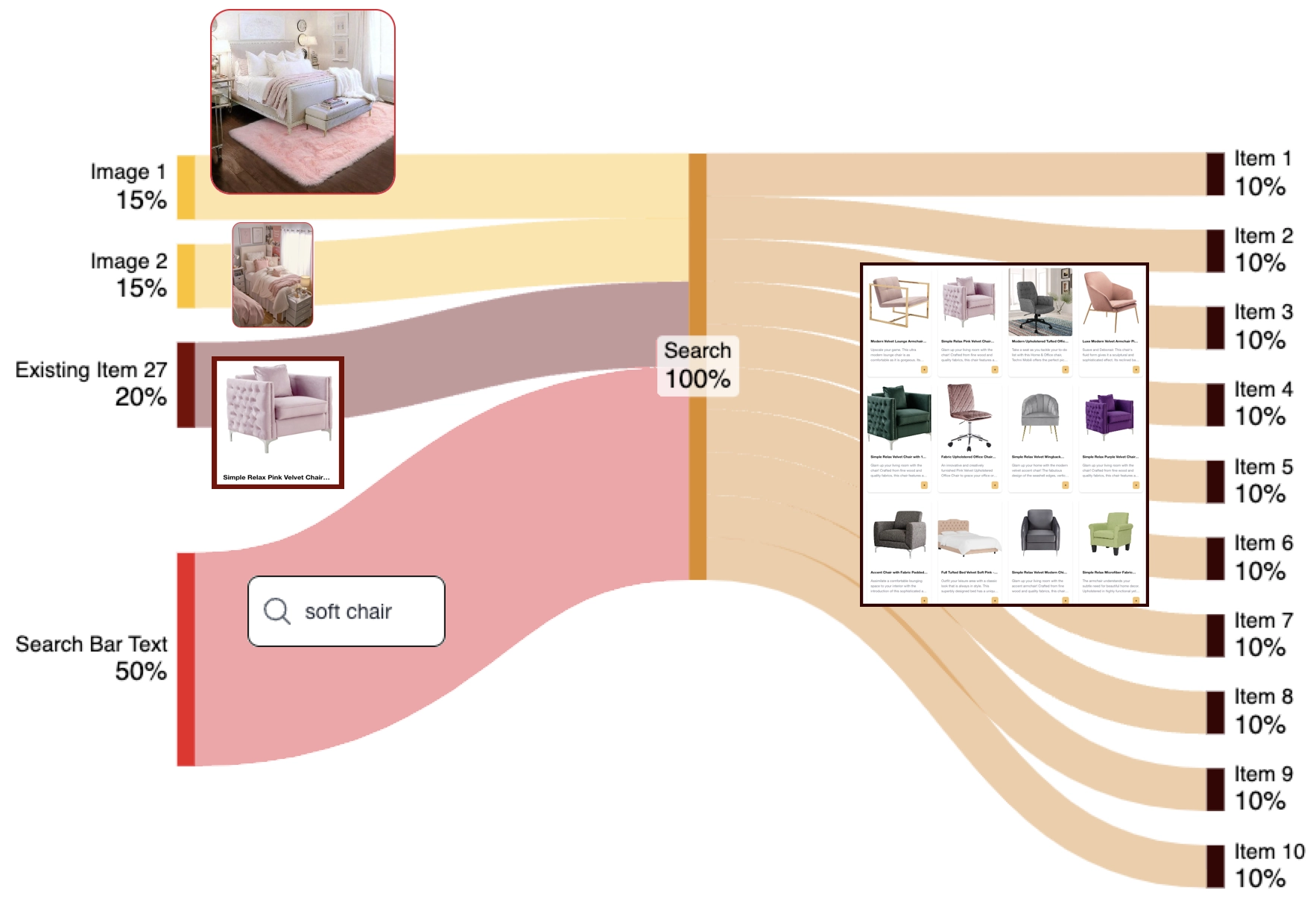More-Like-These™ Search
This powerful endpoint enables developers to create a rich discovery experience by blending text, items, and embeddings. It allows for a nuanced search within the embedding space, where various elements can be mixed and matched in different proportions.
Consider using More-Like-These™ search for:
- Personalizing search results based on session or long-term user data.
- Incorporating external sources to enhance search with specific styles or properties.
- Combining multi-modal inputs, such as blending image embeddings or text descriptions with current searches.
- Creating nuanced searches by using an item as a base and adding a textual twist to find similar yet distinct items.
- Excluding certain elements from searches by using one item as a base and another as a reference for what to avoid.
Standard Search Options apply
Filtering, pagination, accuracy etc all apply to this endpoint
these
theseThe these object is an array combining various items into a single search space, each with a specific weight. The weights do not need to sum to 1. The last action (at the very top level these object) is to be normalized to a unit vector, and fit within a -1 to 1 range.
weightand ONLY one other fieldThe items in the
thesearray must have a weight, and then one and ONLY one of the other fields. You will receive an error if you populate more than one of thesequery_textquery_document_idembeddingthese
weight (required)
weight (required)A value that sets the blending factor for each element. Positive values strengthen the influence, while negative values reduce it, useful for "NOT like this" scenarios.
query_text
query_textTextual input for the LLM provider, such as:
slender modern desk for my dorm roomoutdoor end tables for a Napa patiosoft throw pillows
Vantage Managed Embeddings (VME) only!
query_textis only available for Vantage Managed Embeddings, where you have an LLM provider configured for your collection.
query_document_id
query_document_idReferences an existing item's ID, for example:
item-27SKU-102022283830228
embedding
embeddingA JSON array representing an embedding in the collection's space, useful for externally generated embeddings:
[0.2338382, -0.283832 .....][0.8383289, 0.83837272 .....]
these
theseAllows nesting of these objects to group items with equal weighting, enabling hierarchical structuring of elements.
[{"query_text": "half", weight:0.5}, {"query_text": "other half", weight:0.5}]
Example: soft chair + item 27 + two Pinterest images
soft chair + item 27 + two Pinterest imagesLet's use a practical example: a query that combines 30% imagery, 20% an existing catalog item, and 50% textual input.

Search Text (50%)
The user is searching for a soft chair.

Images (30%)
Two Pinterest board images, embedded into the model, serve as embedding vectors representing their classification within the space.


Item 27 (20%)
An item from the catalog that the user has shown interest in.

{
"these" : [
{
"embedding": [ 0.2, 0.1, -0.1 ... ], // Image 1
"weight": 0.15
},
{
"embedding": [ 0.1, 0.11, -0.9 ... ], // Image 2
"weight": 0.15
},
{
"query_document_id": "item-27", // Item 27 in collection
"weight": 0.2
},
{
"query_text": "soft chair", // Search Bar Text
"weight": 0.5
}
]
}// In this example the most influential weight is 0.75 but its being influence by the 0.25 and everything washes out
// (1 * (0.5 + 0.5)) + (-1 * (0.75 + 0.25)) = 0
"these" : [
{weight: 1, "these": [
{weight: 0.5, query_text: "text1"},
{weight: 0.5, query_document_id: "doc1"},
]},
{weight: -1, "these": [
{weight: 0.75, query_text: "text2"},
{weight: 0.25, query_document_id: "doc2"},
]},
]
//This would produce the same result
//(1 * (50 + 50)) + (-1 * (75 + 25)) = 0
"these" : [
{weight: 1, "these": [
{weight: 50, query_text: "text1"},
{weight: 50, query_document_id: "doc1"},
]},
{weight: -1, "these": [
{weight: 75, query_text: "text2"},
{weight: 25, query_document_id: "doc2"},
]},
]//This would bias heavily towards the negative "these"
//(1 * (50 + 50)) + (-10 * (75 + 25)) = -900
"these" : [
{weight: 1, "these": [
{weight: 50, query_text: "text1"},
{weight: 50, query_document_id: "doc1"},
]},
{weight: -10, "these": [
{weight: 75, query_text: "text2"},
{weight: 25, query_document_id: "doc2"},
]},
]//Lastly this example is dominated by the 50 for 'text1'
//(1 * (50 + 0.5)) + (-1 * (0.75 + 0.25)) = 49.5
"these" : [
{weight: 1, "these": [
{weight: 50, query_text: "text1"},
{weight: 0.5, query_document_id: "doc1"},
]},
{weight: -1, "these": [
{weight: 0.75, query_text: "text2"},
{weight: 0.25, query_document_id: "doc2"},
]},
]Updated about 1 month ago
